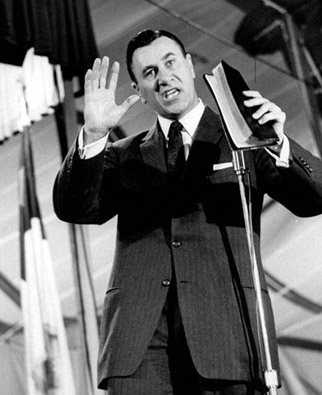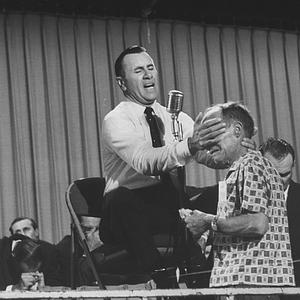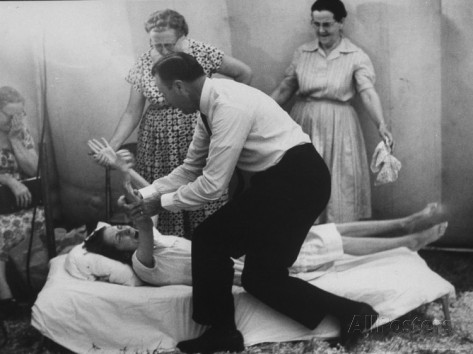We need saving, but so do the saviors. Most of the preachers on TV now are secular and political, selling “news” like so many gold coins of questionable purity, but they were largely religious once and Oral Roberts was the father of them all, the original amen aspirationalist, who delivered his tent-revival “healings” to American living rooms, receiving generous cash donations for his trouble, successfully cultivating his image like an adman, eventually setting up his self-described “prodigal son” as his successor. It all went to hell in the 1990s: Funds were misused, power abused, and the family’s megachurch-and-university empire toppled. An excerpt follows from “The Prodigal Prince: Richard Roberts and the Decline of the Oral Roberts Dynasty,” a Kiera Feldman piece republished at Longreads.
_____________________________
Born in 1918, Oral Roberts was the son of an itinerant preacher in the Pentecostal Holiness Church—“Holycostal Penniless,” kids in the church called it. When Oral’s father was off preaching from town to town, sometimes the family would run out of money, and Oral and his mother would have to beg food from friends and neighbors. In the first half of the 20th century, Pentecostals were farmers, preachers, janitors, and rural teachers. Indelibly shaped and scarred by poverty, this was the movement that birthed the prosperity gospel in the latter half of the century.
In Pentecostalism, Oral is considered the godfather of the charismatic movement, which emphasizes divine miracles and ecstatic experience. Beginning in the late 1940s, Oral held crusades across the country and all over the world, his 10,000-person tent overflowing with those desperate for his touch to heal their suffering bodies and—often—finances. In the decades that followed, Oral turned faith healing into a wildly profitable enterprise. He hired top-notch admen and direct-mail consultants who perfected a method for using targeted mailings to solicit donations. The rate of return was so high that Oral’s ministry had to get its own zip code.
Oral longed for middle-class respectability. Being a traveling faith healer and direct-mail mogul would never get him there. But brick and mortar would. When tent crusade audiences began to wane in the early 1960s, Oral switched gears and built a Pentecostal university, the first of its kind. From gold-tinted windows to golden latticework to the Prayer Tower’s royal blue stripes and cherry red overhang, the entire campus glittered under the Oklahoma sun. “Nothing second-class for God,” Oral liked to say.
Wayne Robinson, a former aide, grew up “Holycostal Penniless” as well. In his 1976 memoir, Oral: The Warm, Intimate, Unauthorized Portrait of a Man of God, Robinson depicts a fundamentally insecure person who spent a lifetime “constructing edifices which, once they are built, must be replaced by new structures—each time larger. Over and over again, these monuments declare, ‘I ain’t poor no more!’ The nouveau riche tone of the ORU campus speaks of the poor boy who made it big. The gleaming gold is a reassuring renouncement of empty pockets and an empty stomach.”
Oral was an absentee father, always off traveling the world on the tent crusade circuit. The few days a month when he actually was home, anything the family did or said was liable to end up incorporated into a television script. It was all ‘grist for the mill,’ remembers Robinson.
Of the four siblings, it was Richard who won his father’s attentions, because Richard could be put to use: He could sing and he loved the stage.•



